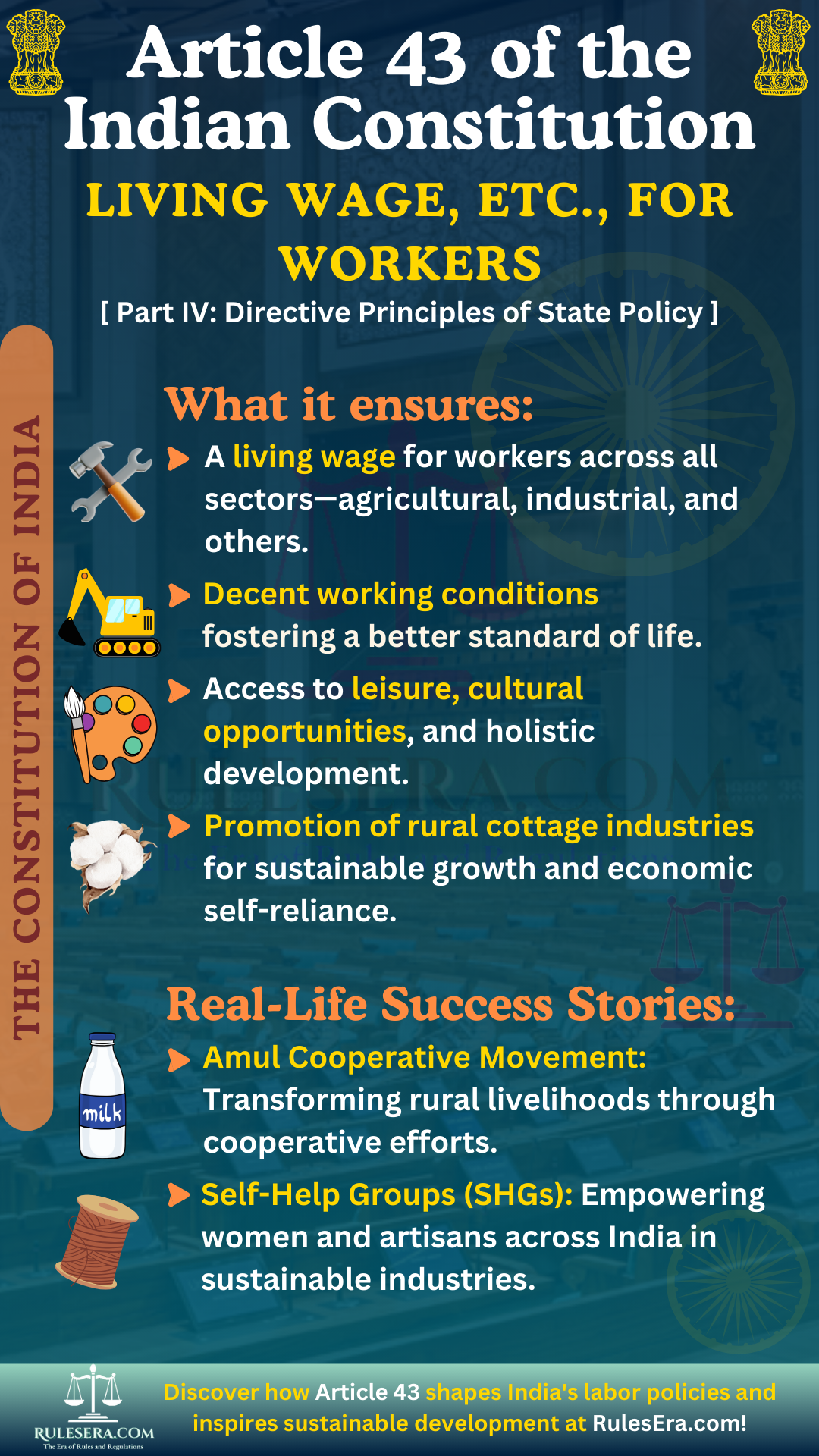Part IV: Directive Principles of State Policy
Article 43: Living wage, etc., for workers

--- Original Article ---
The State shall endeavour to secure, by suitable legislation or economic organisation or in any other way, to all workers, agricultural, industrial or otherwise, work, a living wage, conditions of work ensuring a decent standard of life and full enjoyment of leisure and social and cultural opportunities and, in particular, the State shall endeavor to promote cottage industries on an individual or co-operative basis in rural areas.
Explanation
Article 43 is a key element of the Directive Principles of State Policy, advocating for the welfare of workers by ensuring living wages, decent working conditions, and opportunities for cultural and social development. It also promotes the development of cottage industries in rural areas to foster local economic sustainability.
Provision of a Living Wage
The State is tasked with ensuring that all workers, whether agricultural, industrial, or otherwise, receive a living wage that supports a dignified life, including access to education, healthcare, and social mobility.
Ensuring Decent Working Conditions
Article 43 mandates that workers must be provided with safe and fair working environments, ensuring their physical and mental well-being. This includes reasonable working hours and access to healthcare services.
Promotion of Leisure and Cultural Opportunities
This article also recognizes that workers should have time for leisure and opportunities for cultural engagement. This holistic approach aims to foster personal growth and social inclusion.
Encouragement of Cottage Industries in Rural Areas
The State is encouraged to promote cottage industries on both individual and cooperative bases in rural areas, helping to strengthen local economies and preserve traditional crafts, while reducing urban migration.
Amendments
Although Article 43 has not been directly amended, laws like the Code on Social Security, 2020 and the Code on Wages, 2019 have been enacted to operationalize its principles and safeguard the interests of workers.
Real-Life Examples
- Self-Help Groups and Cottage Industries in Rural India: SHGs in Kerala and Gujarat have empowered rural workers, particularly women, to engage in cottage industries like weaving and handicrafts, promoting local economic development.
- Amul Cooperative Movement: The Amul cooperative in Gujarat has empowered rural dairy farmers, improving their economic prospects and promoting local industries.
Historical Significance
Article 43 reflects India’s post-independence efforts to secure social and economic justice for workers. The exploitation of laborers during the colonial era led to strong advocacy for fair wages and better working conditions, which were institutionalized in the Directive Principles of State Policy.
Legislative History
Article 43 was introduced as Article 34 of the Draft Constitution and debated on November 23, 1948. The final version reflects discussions on promoting rural cottage industries and safeguarding worker rights.
Debates and Deliberations
During the Constituent Assembly debates, Shri Mahavir Tyagi and Shri T.A. Ramalingam Chettiar highlighted the importance of promoting rural cottage industries and securing economic democracy. Dr. B.R. Ambedkar accepted amendments to promote cottage industries on both individual and cooperative bases, leading to the unanimous adoption of Article 34, later renumbered as Article 43.
Frequently Asked Questions (FAQs):
Article 43 focuses on ensuring a living wage, decent working conditions, and the promotion of cottage industries in rural areas.
By encouraging the promotion of cottage industries in rural areas, Article 43 supports local economic development and helps reduce migration to urban centers.